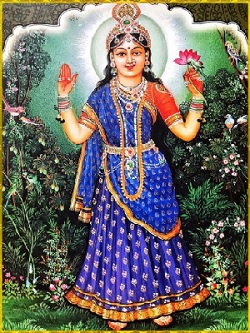INTRODUCTION :
Tulasi is considered as a sacred plant in Hinduism. Hindus regard it as the manifestation of the goddess Tulasi. She is the incarnation of Goddess Lakshmi. The offering of tulasi leaves is compulsory in the worship of Lord Vishnu. Many Hindus have the habit of planting tulasi plants in their home. Tulasi Devi is also known by various names such as Vrinda, Vaishnavi and Haripriya. Tulasi was married to Jalandhara, a powerful demon. Jalandhara had done lot of bad deeds and gave disturbance to the entire universe. Finally, he was killed by Lord Shiva. After that, Lord Vishnu appeared before tulasi, and asked her to return to “VAIKUNTA” as Goddess Lakshmi. It is believed that Gandaki River in Nepal is the AMSHA of Goddess Tulasi, and contained the features of Goddess Tulasi.
IMPORTANCE :
Tulasi plant is also regarded as the holiest among all other plants. The Tulasi plant is regarded as a best medicinal herb, and it is used mainly for curing cough and cold, fever and also used as an ayurvedic medicine. When a person who took care of the Tulasi plant and pours water regularly, will attain the divine abode of VAIKUNTA. And also all the negativity of thoughts will be removed by worshiping Tulasi plant. Good fortunes will occur in the life, and all the problems occurring in our everyday life will be immediately wiped out. Goddess Lakshmi will permanently stay in our house and we will get sufficient wealth in our life. On 25th December of every year, the festival for tulasi will be celebrated in a grand manner mostly in north india. Garlands made of tulasi leaves, are adorned to Lord Vishnu and to his avatars, and also to Lord Hanuman. Wearing Tulasi malas in the neck are considered to be very auspicious. And it will prevent the evil effects occurring to the body. Hence it is very important to worship goddess tulasi regularly, in order to achieve good results in our life. Let us praise her glory, and be blessed.
“OM SREE TULASI DEVIYE NAMAHA”
“OM NAMO NARAYANAYA NAMAHA”
SENT BY
R.HARISHANKAR









